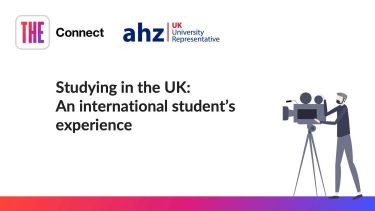Ogheneruona Maria Esegbona-Isikeh’s decision to study data journalism at Birmingham City University has given her the opportunity to meet new people and build a career
International students have a difficult decision to make when choosing an overseas institution to enrol at. Academic factors, administrative hurdles and financial constraints must all be considered as part of a choice that could have a major long-term impact.
Ogheneruona Maria Esegbona-Isikeh came to the UK from Nigeria to study for a master’s degree in data journalism at Birmingham City University. “The level of diversity within the UK was one of the things that attracted me. You get to make friends with people from different ethnic groups and different parts of the world and this means you learn a lot,” she says.
To reap the benefits offered by the UK’s higher education space, international students have to meet certain requirements to enrol in postgraduate study. Chief among these is that master’s students must study a degree that is connected to their undergraduate studies.
“I studied mass communication in my undergraduate course,” Esegbona-Isikeh says. “This meant in my master’s degree, I had to study data journalism. I really wanted to move into project management, but it wasn’t possible because I hadn't studied anything in this field before. In the end, I'm glad I ended up studying data journalism as it’s pushed me to learn more about communication.”
Other requirements for international students coming into the UK are financial. For example, Esegbona-Isikeh had to show her prospective institution that she had the money to pay half of her university fees before entering the country. “Another requirement is that you have to pay a deposit of 25 per cent of your school fees before you enrol,” she explains.
In terms of the other challenges unique to international students enrolling in a UK higher education institution, they must prove their intent to study in the country. They can only apply for their visa once they have their Confirmation of Acceptance for Studies (CAS) number and before this is issued, they must have paid the 25 per cent deposit stipulated by their chosen university.
“I had a lot of support from my professor,” Esegbona-Isikeh says. “When I started the course, I arrived late. I was supposed to resume my studies in September, but I came back in October and my professor was always sending me materials to read and we were always in contact via email.”
Esegbona-Isikeh also had support from AHZ, a university representative for top UK institutions, with the organisation helping her during her application and setting up social events in Birmingham so that international students could meet each other. “The support from AHZ was amazing,” she says. “At the event they put on in Birmingham, for example, we all ate, drank and got to know each other. And it was all completely free.”
As well as the social experiences that international students gain, undertaking a degree in the UK can also lead to long-term career opportunities that would be difficult to achieve anywhere else. For Esegbona-Isikeh, her time studying data journalism at Birmingham City University created job prospects immediately.
“I’m on my postgraduate visa right now,” she explains. “I just got a job as a building control officer and right after this I’m starting a course on learning SQL. This will allow me to fully immerse myself in the technology sector. This is a field that this country is particularly strong in, so I’m delighted with my decision to study data in this country.”





